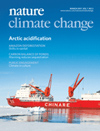-
A Better Model for Future Society, and Analyzing Communal Climate Conflict
April 5, 2017 By Schuyler Null Forecasts of future climate conditions are fairly good, but forecasts of future socioeconomic conditions are another story. To get a sense of how climate change will impact society, many resort to simply layering future climate conditions on top of current socioeconomic conditions. That’s a mistake, write Wolfgang Lutz and Raya Muttarak in Nature Climate Change. “We see little value in the purely hypothetical exercise of assessing potential impacts of the future climate on a society that will not exist in the future.” Instead, Lutz and Muttarak advance the idea of using a “demographic metabolism” model to better understand future adaptive capacity. Educational attainment is a strong proxy for a population’s adaptive capabilities, they write, even better than income, and critically it can be projected fairly accurately into the future since schooling is either attained or not early for each generation and can’t be lost. This analysis also argues for a stronger emphasis on “soft adaptation measures,” like education and other ways to improve human capital, which are cheaper and more flexible, if not less visible, than infrastructure and technological measures.
Forecasts of future climate conditions are fairly good, but forecasts of future socioeconomic conditions are another story. To get a sense of how climate change will impact society, many resort to simply layering future climate conditions on top of current socioeconomic conditions. That’s a mistake, write Wolfgang Lutz and Raya Muttarak in Nature Climate Change. “We see little value in the purely hypothetical exercise of assessing potential impacts of the future climate on a society that will not exist in the future.” Instead, Lutz and Muttarak advance the idea of using a “demographic metabolism” model to better understand future adaptive capacity. Educational attainment is a strong proxy for a population’s adaptive capabilities, they write, even better than income, and critically it can be projected fairly accurately into the future since schooling is either attained or not early for each generation and can’t be lost. This analysis also argues for a stronger emphasis on “soft adaptation measures,” like education and other ways to improve human capital, which are cheaper and more flexible, if not less visible, than infrastructure and technological measures. One reason for so little consistency in the climate change and conflict literature could be research design, according to a paper by Jonas Nordkvelle, Siri Aas Rustad, and Monika Salmivalli in Climatic Change. “The innovation in this paper is that we explore how climate variability can be used as a randomized variable, and let this guide our design choices,” they write. Comparing unusually wet and dry periods across months in “area-month sets” for parts of Nigeria, Kenya, Uganda, Darfur, and India, they find that both departures from the norm affect conflict in different ways. Unusually wet periods that last longer than a year increased the chances the conflict, while drought tended to have an effect only in the short term. “Possibly, there needs to be some resource abundance for communal conflicts to ‘pay off’ (long, unusually wet periods), while droughts that destroy harvests (short, unusually dry periods) pull resource-scarce groups into violence,” they write. A recent history of conflict related to drought also increased the chances for future conflict. Nordkvelle et al. caution, however, that these results should only be understood to apply to communal conflicts, not state-based conflicts like civil war.
One reason for so little consistency in the climate change and conflict literature could be research design, according to a paper by Jonas Nordkvelle, Siri Aas Rustad, and Monika Salmivalli in Climatic Change. “The innovation in this paper is that we explore how climate variability can be used as a randomized variable, and let this guide our design choices,” they write. Comparing unusually wet and dry periods across months in “area-month sets” for parts of Nigeria, Kenya, Uganda, Darfur, and India, they find that both departures from the norm affect conflict in different ways. Unusually wet periods that last longer than a year increased the chances the conflict, while drought tended to have an effect only in the short term. “Possibly, there needs to be some resource abundance for communal conflicts to ‘pay off’ (long, unusually wet periods), while droughts that destroy harvests (short, unusually dry periods) pull resource-scarce groups into violence,” they write. A recent history of conflict related to drought also increased the chances for future conflict. Nordkvelle et al. caution, however, that these results should only be understood to apply to communal conflicts, not state-based conflicts like civil war.Sources: Climatic Change, Nature Climate Change.
 A Publication of the Stimson Center.
A Publication of the Stimson Center.





